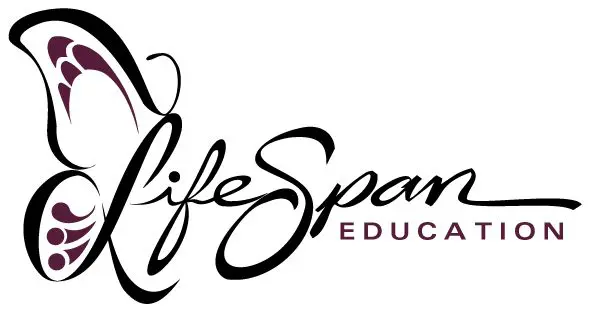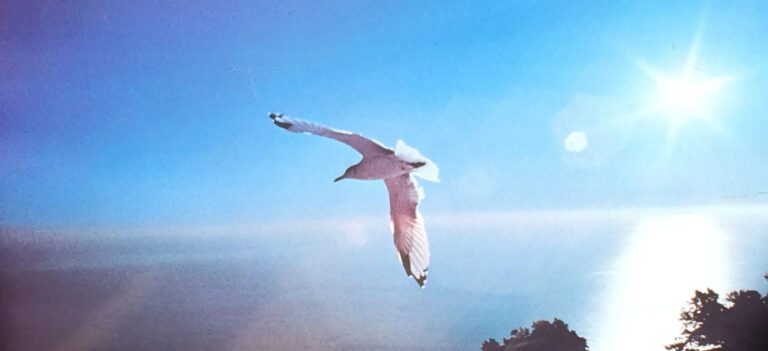Butterflies, Birds, and Other Messengers from Beyond the Veil
“After I’m gone, look for me in birds.” Andy McMillan
“Will I die, too?” Angelica, a ten-year-old dear to my heart, asked me while we sat close together on a bench in a small church cemetery. A week earlier, Angelica’s 18-year-old sister Bethany had been killed in a head-on vehicle collision on a beautiful sunny day while she was driving a back road to her volunteer job as a paramedic for the local fire department.
Only a few days before, we had celebrated Bethany’s stellar life along with nearly a thousand people crowded into and overflowing from the standing room only church into an auditorium where the service was being live-streamed. Many of the attendees were Bethany’s fellow students and faculty members from the school for the gifted she had attended, laying groundwork for her planned career as a pediatric ER physician. The choir section was filled with her rescue squad colleagues, facing the huge audience of family, friends, parents of children whom Beth had babysat over the years, young athletes she had coached, and members of her immediate and large extended families. Several first responders in the choir section openly wept.
Outside the church entrance were positioned two fire trucks end to end with ladders extended and an American flag hung from them as a sign of respect for a fellow first responder who had been lost in the line of duty. Some of the paramedics attending the “celebration of her life” had traveled from places around the country to honor her.
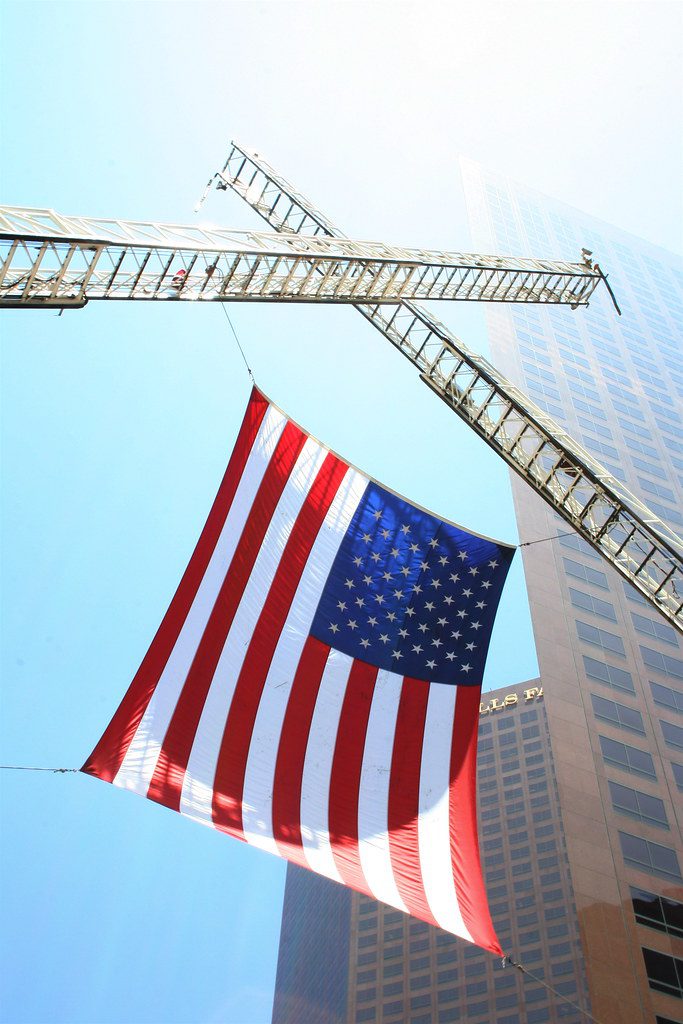
Bethany’s mom Karla was my closest friend and her husband Tom was like a brother. I had long been considered a member of their family. Their four children had been like grandchildren to me. All of us were still in shock and heartache from her sudden, inexplicable death.
Losing Bethany, the oldest of the children, was the first significant loss of a loved one I had ever experienced. It felt to me as if the world had tilted on its axis.
Shortly after I had arrived at their house after hearing the terrible news, Karla asked me if I would do whatever I could to support her children emotionally through this devastating time in their lives. Although I had no training as a grief counselor and would be “learning on the job,” I promised to do my best to address their needs in whatever seemed to me to be age-appropriate ways.
Now I sat at Bethany’s gravesite with Angelica, trying to answer her questions and calm fears that were to be expected of someone so young at a time like this. I knew her to be a sensitive, astute child, so I had to choose my words carefully. If someone as alive, physically active, and passionate about life as her big sister could be killed suddenly, it was perfectly understandable for Angelica to fear that she might, too.
“All of will die eventually, honey. But there’s no reason to believe that you will die young like your sister did.”
“But why did she have to die so young?” Angelica lamented.
“I don’t know, honey. Maybe it was just time for her to go. Maybe she had learned everything she needed to learn and done everything she needed to do in this lifetime.”
“But where did she go? Some people say she’s in heaven, but Dad says she’s still here with us. How could both of those things be true?”
Up to this point, I had managed to answer each question she posed to me with some level of comfort and confidence. Now I was stumped. How could I explain to her how someone who had died could be in two places at once?
I sat quietly for a moment, searching my mind for the right words to say.
Then the answer came to me—on the wings of a butterfly.
While we sat looking at the flowers on Beth’s grave, a yellow and black butterfly flew in from out of our sight and alighted on one of the flowers in front of us.
Angelica and I looked at each other in wide-eyed, open-mouthed surprise, both of us sensing we were no longer by ourselves. We watched the butterfly for just a brief time as she opened and closed her wings several times and then flew off to the woods beside the cemetery.
Angelica looked at me with sudden awareness.
“Was that her?” she whispered, wide-eyed.
“I think so,” I said, softly.
It was the second time that week one of us had experienced Bethany in this form, though Angelica did not know that. Tom had told me about a similar experience that had occurred at the graveside service.
“Did you see the white butterfly hovering over all of us there the whole time? I think it was Beth!” he had shared with me.
We had never talked about such things, and I had no knowledge of his spiritual beliefs. But he was certain about what he had witnessed and seemed comforted by it.
Now Bethany was with us again at her gravesite. And I had the strong feeling that it was she who gave me the sudden inspiration and clarity about how to answer Angelica’s question.
I pointed to the church nearby at the edge of the woods.
“See that church? The people who attend it believe that there is a place called heaven where people go after they die. And maybe that’s true. But maybe it’s possible for them to be here with us at the same time when they want to be, or when we need them and call on them. You see, they are no longer stuck in their physical bodies like we are. They are able to be here, there, and anywhere, all at the same time. They are free to come and go as they please.”
Angelica seemed satisfied with my answer and followed quickly with more questions.
“How will I know when she’s near me? Can I communicate with her?”
As we walked arm-in-arm back to my car to leave, I said things to her that I had never even thought about or articulated for myself. It was as if I was channeling wisdom from somewhere or someone else.
“You may know when she’s near, like we just did. We were thinking about her and wanting her here, and she came to us. Whenever you want to be close to Bethany, just think about her and ask her to make herself known to you. You may not be able to see her in the way you used to, but you’ll feel her presence. Or maybe she will take the form of something like another butterfly that you can see. You just have to pay attention.”
“And, yes, you can talk with her and tell her your worries and share your happy feelings with her. She is still here for you. Her spirit may have left her body, but she hasn’t left you.”
A few days later, Angelica and I were at the small community pool with her mom and her eight-year-old brother, Rick.
While the four of us were sitting together at one of the tables beside the pool, where Bethany and all the other children had learned to swim and where she later worked as the pool cleaner and lifeguard, a large black butterfly landed on the table right in front of us.
Angelica reached out to touch it. Surprisingly, the butterfly allowed her to stroke its wings. Rick quickly followed suit, reaching out to caress it. Their interaction lasted for several minutes, both children marveling at this beautiful butterfly that had decided to visit them.
Karla and I had had no discussion of her husband’s experience at the graveside service. Knowing how much they were struggling with their unspeakable grief over the sudden loss of Bethany, I doubt they had discussed it. Nor had Angelica or I told her about the encounter with the butterfly at the gravesite.
But now Karla looked at me as if she knew the visitor was Bethany. She smiled.
My friend and I had never discussed her spiritual beliefs. But she seemed to take meaning from the message she and the children had just received from beyond the veil that exists between the living and those who already have passed through it. Never before nor since have I seen or heard of a butterfly allowing itself to be petted.
I later learned that it is harmful to a butterfly to have its wings stroked by someone. Yet this one had seemed to invite it.
Months later I read in a nature magazine that in some South American cultures people believe that the monarch butterflies that migrate there from the northern climes are their dead children coming back to visit them. I understood why.
Since then, many of Bethany’s family members and others close to them have had repeated encounters with Beth, sometimes in the form of a butterfly, sometimes in other forms, like the large blackbird feather left on her closest cousin’s car window, right when she needed it as a reminder that her best “bud” was still close by.
A Tribute and Another Devastating Tragedy
Bethany’s death, and our experiences with butterflies afterwards, inspired me to rename my long-existing business a more encompassing, accurate title of “Lifespan Education” and to use a butterfly for its logo.
At the time, I did not know that an even more impactful loss for me was yet to come. A loss that would knock the world I had known out of its orbit: my husband’s tragic death at the hands of the broken medical industry.
Since Andy passed through the veil in 2014, his spirit has visited me, his family and close friends in the form of certain birds he had loved as a birder, especially the great blue heron (his totem bird), or as an eagle or a mockingbird, a McMillan family favorite.[i]
When I was drowning in my grief in the first few months after Andy’s death, only going through the motions of living every day, I had a telling experience with a small bird. Every morning after I first got up, I would go to the front porch of the house to pick up the newspaper, more from habit than any interest in reading it. From there, I could see our large Winnebago bus parked close by on a pad in the front yard.
One morning, my attention was drawn to the RV where a bird was acting strangely. It would jump up on one of the shiny hubcaps on the huge tires, peck at it loudly several times, then jump back to the ground and turn around to look at me. The bird did this repeatedly, as if it were trying to communicate something to me. This happened three mornings in a row before I finally understood that it was a message from Andy:
“Honey, you need a road trip! Pack up your stuff and go to the beach.”

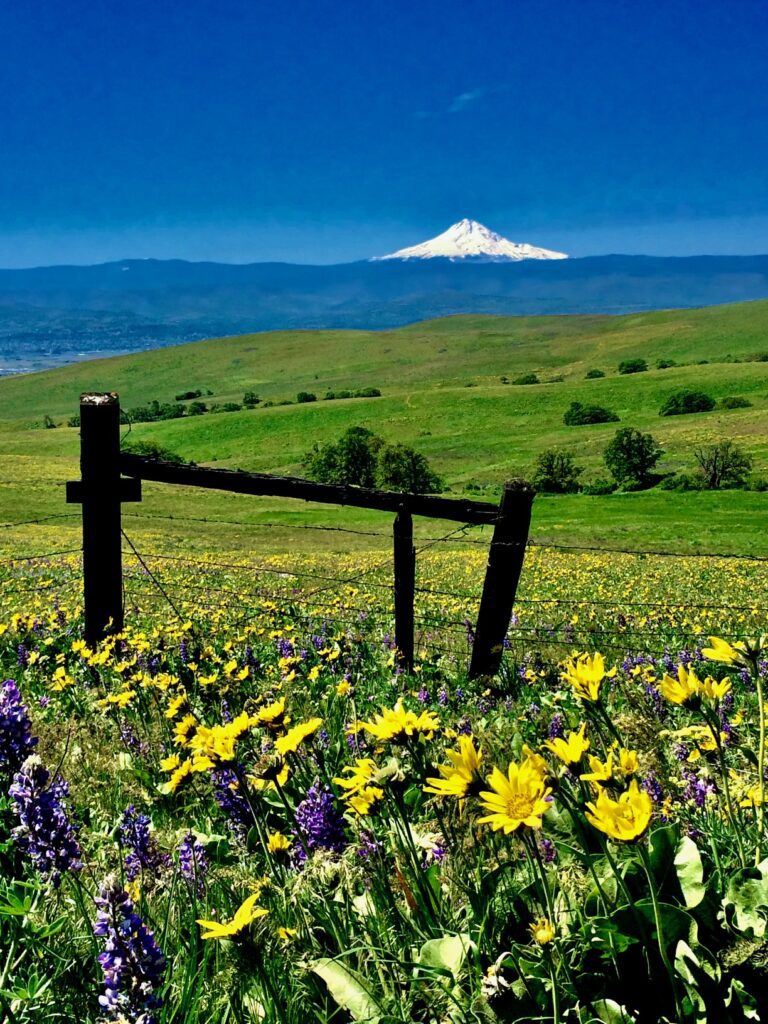
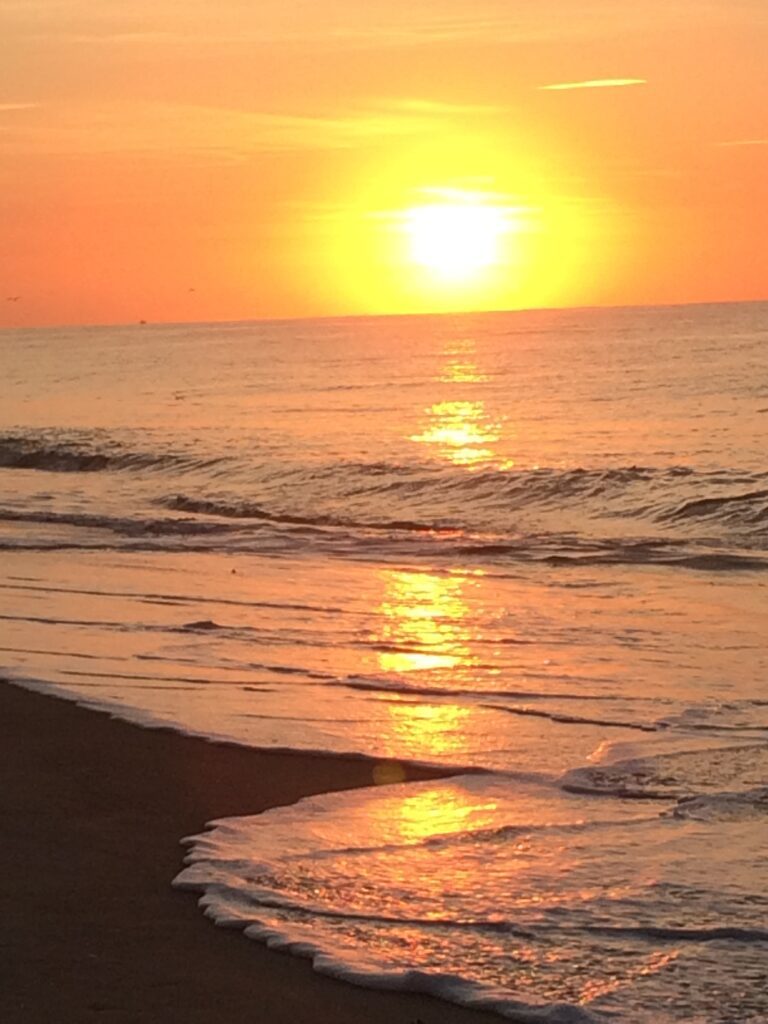
{Photos by Evonne Hedgepeth}
That was exactly what I needed: time alone at places where Andy and I had spent so many days and hours together enjoying and communing with Mother Nature. I loaded up the rig and went to two of our two favorite places to boondock camp: first to the Pacific Coast for a couple of weeks; then to the Columbia Gorge for two more weeks.
But I wanted and needed more of this balm to my spirit—much more. My grief was so suffocating and overwhelming, it required the vastness of oceans, the width and depth of ancient canyonlands, the hours of hearing the whine of the RV tires on lonely stretches of the open road, the skywatching at night and complete isolation from others to begin the long healing process.
By the spring of 2015, I had meticulously pre-planned and mapped out my route from Washington State to North Carolina, stocked up all my necessities for months-long travel and contacted all the colleges and other places where I wanted to camp. On Earth Day of 2015, I finally embarked on my solo cross-country grief healing odyssey that spanned 16 months.
The first long leg of my trip culminated at Cape Lookout on the Atlantic beach coast where Andy and I had spent our first “honeymoon” together. There I placed some of his ashes into the rip tide of waters swirling between the point of Cape Lookout and a tiny island across from it, mingling them into the confluence of waters of the ocean and the Back Bay. (Someday I may post the story I wrote about that experience: “The Island.”)
All along the trip, I received messages from Andy that kept me out of harm’s way on my arduous and perilous journey (chronicled in my second memoir The Constant Moon: Taking the Long Way Back.) Birds were my frequent guides and security guards, watching over me and pointing me to safer ground as I navigated unfamiliar territory, improved my fledgling skills as an RV boondocking person with chemical sensitivities, camped in an odd assortment of places, and avoided any unwelcome encounters with human predators.
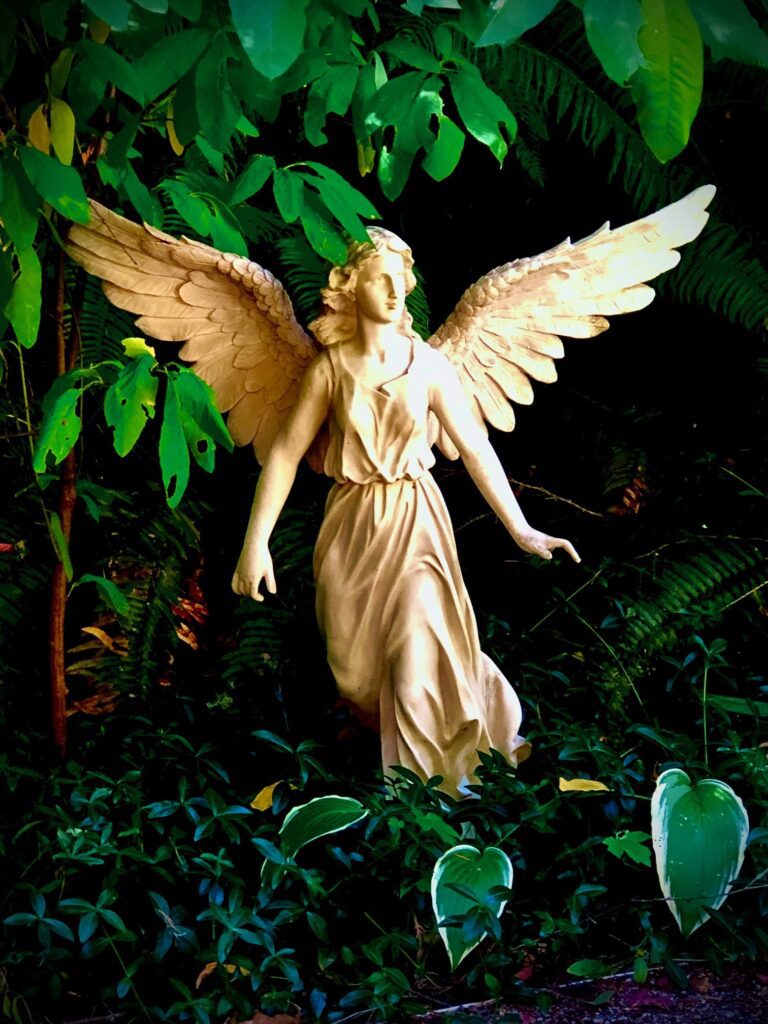
{Photo by Evonne Hedgepeth}
From the Lips of an Angel
One night, while on a year-long layover in Virginia where my family lived, I went to watch sunset at a favorite place. I stayed until the full harvest moon rose out of the trees behind me. In the meantime, I noticed that a bluegrass concert was being set up outside a house near me. I later learned it was an annual event that I just happened to be present for.
I wanted to hear the music but could not sit with the audience because of my sensitivity to chemicals in scented products. Instead, I stood a good distance away from the group–just close enough to hear the music but far enough away not to smell the products.
Suddenly, a woman appeared beside me from the audience. She asked if I wanted to join them or at least have a chair to sit in. I was touched by her kind offer, and we struck up a brief conversation. She had such a sweet countenance and obviously wanted to engage with me.
I told her the synopsis of my story of losing my husband, as I had done with so many others I had met during my travel. But for some reason, I deliberately did not mention his name.
However, I did reveal that I had a troubled mind about a family issue I had been struggling with for months, not sure if I was doing the right things to help resolve it. I was shocked by her response.
“Andy thinks you are on the right path. Just stay on it,” she declared.
I was taken aback, but not by the advice she offered.
“How did you know my husband’s name?” I asked her, suspiciously.
“Oh…well…um…you must have mentioned it,” she protested, blushing.
“No. I didn’t.”
She seemed a bit flustered, said a quick farewell, and went back to join the group.
“You are so busted,” I thought, smiling to myself at her inadvertent disclosure of her identity and mission.
Apparently, when no bird is available for Andy to convey an urgent message to me, he sends an angel instead.

When I die, watch for me in birds.
I’ll be the one flying in perfect, blissful unison with my beloved.
Recommended Read: In Lieu of Flowers: A Conversation for the Living, by Nancy Cobb. Amazon link: https://a.co/d/1vStk4r
[January 1, 2025]
[i] Andy was third cousin to Nell Harper Lee, author of To Kill a Mockingbird. His father, Thomas Morton McMillan, Jr., a much-respected pastor and actor in the South, played Atticus Finch in repertoire theater at the Monroeville County Courthouse many summers in Mort and Nell’s hometown of Monroeville, Alabama.
